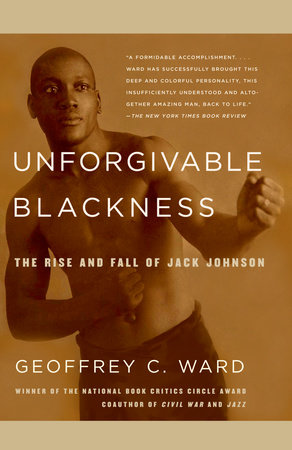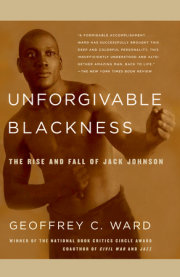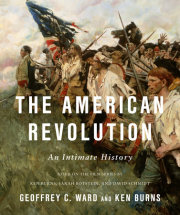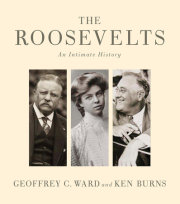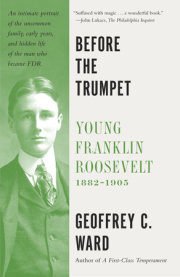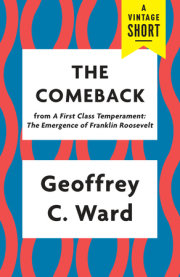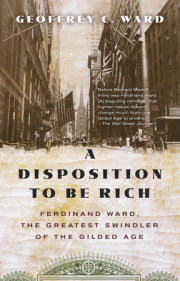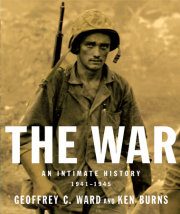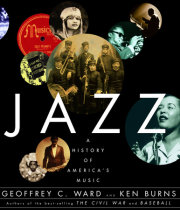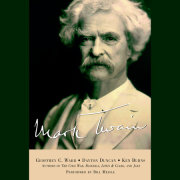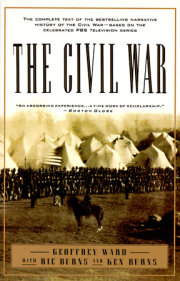The Pure-Blooded American
In the spring of 1910, Halley’s comet returned to the heavens after an absence of seventy-five years. Some believed it a sign from God that the world was about to end. Nearly everyone saw it as a momentous event, and during the week of May 18, when astronomers predicted the earth would pass through the comet’s tail, adults and sleepy children all over the country stumbled out of their homes at night to see if they could get a glimpse of it.
On the Lower East Side of New York, thousands of tenement dwellers, mostly immigrants and their families, filled the streets to peer up at the cloudy skies, while on the roof of the Waldorf-Astoria hotel uptown, Speaker of the House Joseph G. Cannon led two hundred tuxedoed guests attending the annual dinner of the National Association of Manufacturers in a champagne toast to the comet’s passing. In Memphis, Tennessee, separate all-night revivals were held for white and black believers awaiting Judgment Day. In Chicago, panicked householders blocked their doors and windows against deadly gases they believed the comet would release.
And early one morning, at the fashionable Seal Rock House on Ocean Beach at San Francisco’s western edge, guests and staff members alike gathered on the sand beneath the stars, listening to the rhythm of the surf and waiting to chart the comet’s brilliant course above the sea.
But the hotel’s most celebrated guest—the most celebrated black man on earth—remained in bed in his suite on the second floor. A member of his entourage had slipped up the stairs a few minutes earlier and tried to rouse him, but the heavyweight champion of the world had ordered him out of the room. He saw no need to get up. Over the coming centuries there would be hundreds of comets, he said. “But there ain’t gonna be but one Jack Johnson.”
Like a good many of his claims, this one was both outrageous and entirely accurate. He had, after all, battered his way from obscurity to the top of the heavyweight ranks and won the greatest prize in American sports—a prize that had always been the private preserve of white combatants. At a time when whites ran everything in America, he took orders from no one and resolved to live always as if color did not exist. While most Negroes struggled merely to survive, he reveled in his riches and his fame. And at a time when the mere suspicion that a black man had flirted with a white woman could cost him his life, he insisted on sleeping with whomever he pleased. Most whites (and some Negroes as well) saw him as a perpetual threat—profligate, arrogant, amoral, a dark menace, and a danger to the natural order of things.
The real Jack Johnson was both more and less than those who loved or those who hated him ever knew. He embodied American individualism in its purest form; nothing—no law or custom, no person white or black, male or female—could keep him for long from whatever he wanted. He was in the great American tradition of self-invented men, too, and no one admired his handiwork more than he did. All his life, whites and blacks alike would ask him, “Just who do you think you are?” The answer, of course, was always “Jack Johnson”—and that would prove to be more than enough for turn-of-the-twentieth-century America to handle.
Johnson visited Paris for the first time in June of 1908, before sailing to Australia and his long-delayed battle with the heavyweight champion Tommy Burns. It may have been then that he and an unknown French journalist began laboring together over the manuscript that would become the first of his autobiographies.* The language of its opening passage seems stilted, especially in translation, but the thoughts are unmistakably Jack Johnson’s:
When a white man writes his memoirs . . . he anxiously begins with the history of his family from earliest times. It seems the higher one ascends the more interested one is in it. And I think that most authors embroider their genealogy. Basically, none of it interests anyone other than family members.
But I don’t want to exempt myself from this ancient custom and wish to say a few words about my genealogy.
Our [Negro] memories are handed down from father to son. Whites don’t think so, but we blacks are also proud of our ancestors and during long days and still longer nights, though we knew neither schools nor books, we still transmited memories of past centuries. I don’t doubt that the stories have been modified over time, but the salient facts remain. If some parts are merely fables it doesn’t matter much. Who can tell among the white stories what is fact and what is fable?
Facts about Johnson’s ancestry are hard to come by, and he was himself a cheerful fabulist when it came to retelling his own life. But the first thing he wanted people to understand about him was that because his enslaved forebears had arrived in America long “before the United States was dreamed of,” he was himself a “pure-blooded American.” And because he knew that that was what he was, he saw no reason ever to accept any limitations on himself to which other Americans were not also subject.*
Why he insisted on acting that way at a time when most American Negroes were relegated to second-class citizenship remains the essential mystery of his life. No amount of sleuthing will ever fully solve it, but a few clues may lie half-hidden in what little we know of his boyhood.
He was born Arthur John Johnson in Galveston, Texas, on March 31, 1878, the year after the last Union troops were withdrawn from the former Confederacy, leaving freed blacks to fend for themselves.† His parents, Henry and Tina (known as Tiny) Johnson, both ex-slaves, did just that. She was from either North or South Carolina; government records and her son’s various accounts differ. Henry was born in Maryland or Virginia sometime during the 1830s; after serving as a civilian teamster attached to the U.S. Army’s 38th (Colored) Infantry, he settled in Galveston in 1867. His son loyally remembered him as “the most perfect physical specimen I have ever seen.” In fact, Henry stood just five foot five and was severely disabled by an atrophied right leg, the result of exposure to cold and rain and snow in the trenches at Petersburg, Virginia, that had caused the “disease of rheumatism” to distort his right knee—or so his attorneys would later claim in one of several unsuccessful bids he made for a veteran’s pension.
Despite his injury, despite the fact that he could not read and that neither he nor his wife could write, Henry Johnson never failed to find ways to support his family. He worked as a porter in a saloon, then as a school janitor, finally as supervising janitor for Galveston’s East School District. His wife took in washing. Both were faithful Methodists, and Henry sometimes helped with the preaching on Sundays; Jack Johnson’s glib tongue and enthusiasm for public speaking may have been an inheritance from him.
The Johnsons had nine children, four of whom lived to adulthood. They kept them all fed and clothed, saw to it that they attended at least five years of school, and somehow managed to put enough money aside to buy a plot of land at 808 Broadway at the island’s eastern end, and build their own single-story home.
Jack was the Johnsons’ third child and first son, and from the beginning seems to have been the focus of his family’s attention. He was bright, talkative, and filled with energy, but, as he and his mother both remembered, he’d also been frail as a small boy and was still so thin at twelve that the family physician warned he might be tubercular. Like his sisters and brothers, he was expected from early childhood to help keep the family going. He swept out schoolrooms to ease his father’s burdens. “Those devilish brooms were taller than I was,” he remembered. “It was sure the joy of my early life to grow taller than the broomstick.” And he got an early morning job, riding along on a milk wagon to keep an eye on the horse when the milkman got down to make a delivery. Every Saturday night, he was paid ten cents and a brand-new pair of bright-red socks, of which his employer evidently had a limitless supply.
Otherwise, Jack remained at home with his older sisters, Lucy and Jennie, and his younger siblings, Henry and Fannie and an adopted brother named Charles. He was especially close to his mother, who told him again and again he was “the best boy in the world” and assured him he could do anything he wanted if he wanted it badly enough.
Jack Johnson seems to have needed little encouragement along those lines. He saw himself as someone special from the first—someone set apart, not subject to the limitations holding others back. His mother liked to recall what he told her one evening when he was still a small boy doing his homework by lamplight. As she told it,
Jack was reading in the Texas history book about great men, and he turns around to me and he allowed as how he was going to be a great man himself some one of these days. And I says, “Shucks, boy, what you talking about? What you think you’re going to be—president?” He said, no, he wasn’t figuring on being president, but he expects he’ll be something what’ll be just about as big. And that child sure was talking a parable that night.
Johnson would remain deeply devoted to Tiny Johnson until her death, lavishing her with gifts and telling reporters she had been responsible for all his success. After her death, he delivered a pulpit talk called “The Influence of My Christian Mother” before black congregations in several cities. In it, he urged his listeners to “keep your mother’s image before you all the time. Remember what she taught you when you was a youngster, and there is nothing you can’t accomplish.”
That message was reinforced by the city (and the neighborhood within that city) in which Johnson grew up. In 1929, long after his boxing life had ended, he cooperated in writing a series of syndicated articles about his career. In one, he argued that the outstanding black heavyweights of that era, Harry Wills and George Godfrey,* would never reach the heights he had reached, in part because they were from the Deep South and therefore “grew up with the thought implanted in their minds, through generations of tradition, that the COLORED man was not equal to the WHITE. The inferiority complex which was planted in their grandfather and his father has never been shaken off and never will be shaken off.”†
Johnson was a southerner, too, of course, and had also been raised in a city where, as he said, “the whites were in control.” But Galveston was different from most southern communities. It was a seaport and, like its rivals, Mobile and New Orleans, took a more relaxed view of racial separation than did the inland towns and cities of the South. All sorts of people came and went at the waterfront. “You had all walks of life, races, creeds, colors . . . in here,” a longtime resident remembered. “We were segregated but it wasn’t as bad as other places in the state of Texas. . . . That was a unique thing about Galveston. Negroes and Caucasian people were poor and lived in the same neighborhood, ate the same food, suffered the same problems.”
No part of Galveston Island was more racially mixed than the Twelfth Ward, in which Johnson grew up. Its most important citizen was Norris Wright Cuney, who, as the son of a Texas planter and his slave mistress, was regarded as black, not white. At a time when Negro political power was eroding all over the South, Galveston’s “sable statesman” managed to hold on to his for some fourteen years. As alderman, labor organizer, collector of customs for the district of Texas, Republican National Committeeman, and leader of the racially mixed “Black and Tan” faction of the state Republican Party, he was at the time of his death in 1896 perhaps the most powerful Negro officeholder in the country—and a constant reminder to neighbors like young Jack Johnson that a black man need not limit his horizons.*
The public school Johnson and his brothers and sisters attended was segregated, but the streets and alleys through which they raced once school was out were not. “From the time I was old enough to play on the Galveston docks I played with a gang of white boys,” Johnson recalled.
We had a great gang, too, and every kid in Galveston looked up to the 11th Street and Avenue K gang. That was us. My best pal and one of the best friends I have now is Leo Posner, a white boy who was the head of our gang down there. So you see, as I grew up, the white boys were my friends and my pals. I ate with them, played with them and slept at their homes. Their mothers gave me cookies, and I ate at their tables. No one ever taught me that white men were superior to me, and when I started fighting I fought just as enthusiastically against them as I once had fought on Leo Posner’s side.†
Fighting of any kind had seemed alien to Johnson as a small boy. He avoided quarrels, he recalled, ran home rather than face neighborhood bullies, and depended on his older sisters to protect him until he was twelve.
It was in that year . . . when I first discovered that I could fight just a little bit. While going home from school one day, I fell into a heated argument with Willie Morris, one of my school mates. We had just reached my home, and I noticed [a neighborhood woman whom the children called] Grandmother Gilmore standing in the front yard. As I looked in Grandmother Gilmore’s direction Willie struck me in the jaw. Now at that time Willie was much larger than I, and his unexpected blow to my jaw rather stunned me for a few seconds, and upon getting my bearings my first impulse was to run, and perhaps I would have had it not been for Grandma Gilmore. She had witnessed Willie strike me and when she saw that I did not show fight, she called out to me, “Arthur, if you do not whip Willie, I shall whip you.” Now this assertion from Grandmother Gilmore made a different aspect upon the whole thing, it caused me to lose all thought of retreat. At once I figured that I’d much rather give Willie a whipping than receive a whipping myself . . . so immediately I sailed into Willie and whipped him. This was my first fight and I won it by in-fighting and clinching. I clinched Willie and in the breakaway I struck him in the eye which ended the fight.*
Copyright © 2004 by Geoffrey C. Ward. All rights reserved. No part of this excerpt may be reproduced or reprinted without permission in writing from the publisher.

